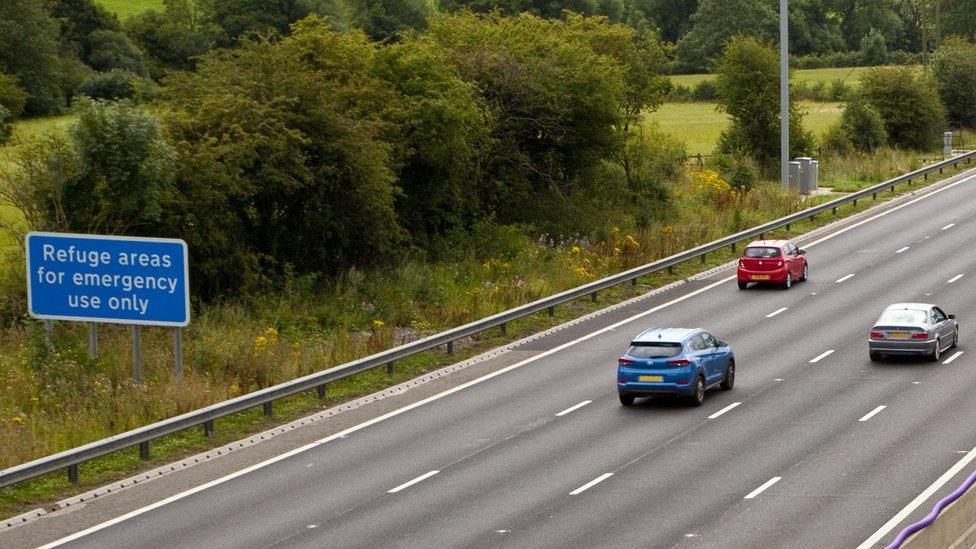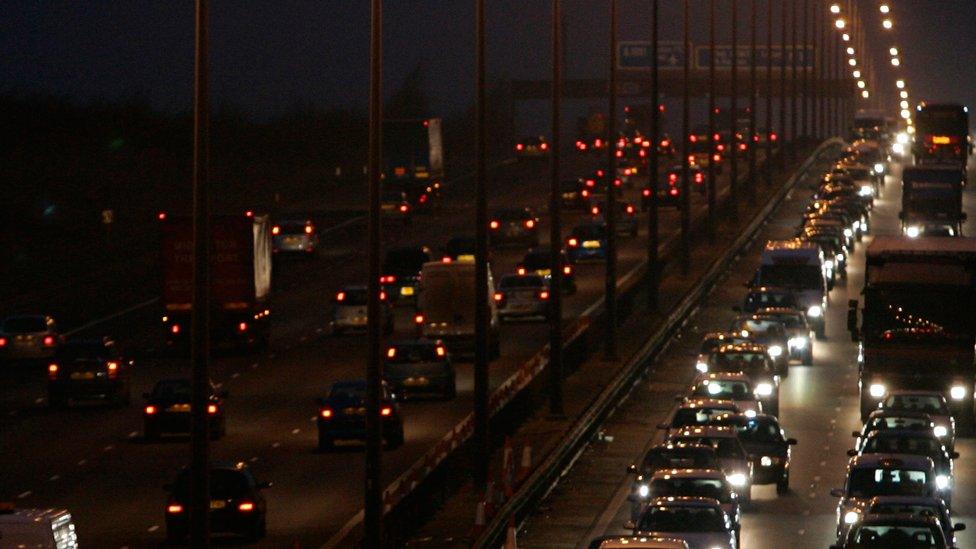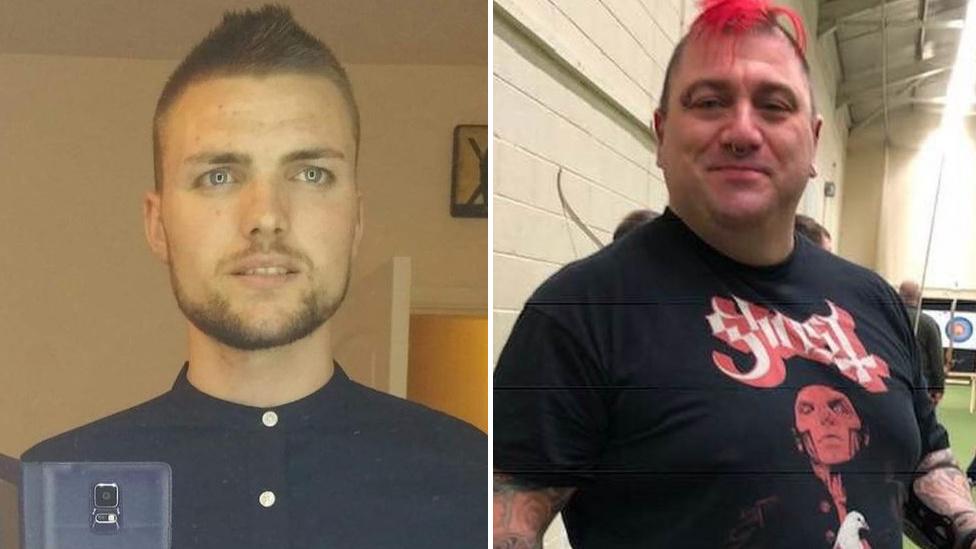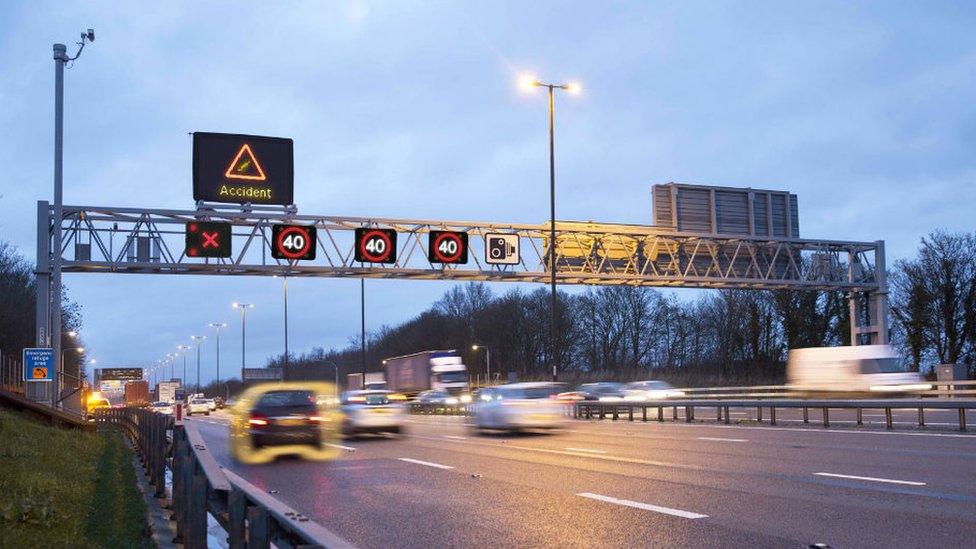'My car rolled six times after smart motorway crash'
- Published

A coroner has called for a review of smart motorways after an inquest heard the deaths of two men on a stretch of the M1 could have been avoided. Between 2015 and 2018, 11 people a year on average died on smart motorways in England.
The roads replace sections of the network and use the hard shoulder to carry traffic, either at busy times or all the time, with emergency refuge stops in place. BBC Radio 5 Live's Your Call has heard from drivers affected by what they've experienced on the roads.
'There was nowhere to go'

Charlotte Chappell was involved in a collision on a smart motorway "blind spot" in Sheffield
Charlotte Chappell, from Sheffield, developed post-traumatic stress disorder after her car flipped six times following a collision on what the 40-year-old describes as a smart motorway "blind spot" on the M1 near the Meadowhall shopping centre.
She says: "After my experience, I never drive in the left lane. I was driving past Meadowhall which is a route that I do regularly. It was about 7pm at night.
"The left-hand lane on that particular area of the motorway is not a hard shoulder because it has become a smart motorway. It is an exit for coming off and down into Meadowhall and a different stretch of road.
"Sadly, when they designed the motorway and made it into a smart road they put one of the refuge areas at the end of a blind bend. So here I was... driving along at 70mph… came around the blind bend to find that there was somebody in the refuge area with their indicator on who pulled straight out in front of me.
"There was a car next to me on the next lane. There was really nowhere for me to go.
"I tried to squeeze between the two cars and ended up getting flipped over and rolled six times down the road, landing upside down. I was pretty quick to get out thinking I was going to get crushed by all the other cars on the motorway.
"The first thing that the ambulance said to me when they came was 'you're so lucky that you're alive, that you've just walked out of that'. I had no physical injuries really.
"The accident was in December 2018 and I'm still living with the consequences now. I find it hard to sleep, my anxiety levels are through the roof.
"About two weeks later, somebody on the other side of the road died in similar circumstances. It's easy for people to say they're safe but if you're the one person that has an accident as a result of it you just can't know what it's like to have an accident like that until it happens to you."
'I left my driving job'

Incidents on smart motorways have led ministers to introduce more refuge spaces for vehicles
John [not his real name], from Brighton, left his job as a long-haul driver after seeing several scary incidents on smart motorways.
He says: "They installed the smart motorways on the worst motorway [given] the amount of freight and haulage and the traffic that are bombing along those inside lanes.
"The problem is that the gantry and the lane enclosures do not work. What you have - and I've witnessed this - there was a woman in a large people carrier trying to get three kids out of the car, with the door open on the outside.
"A truck driver basically blocked the motorway for her. I witnessed so many near misses. I had somebody pull out of a lay-by in front of me and I had to slam my brakes and use my handbrake in the inside lane.
"There's just no time for them to get the speed up... like there is on the hard shoulders. They need to knock it on the head."
'Smart motorways? No they're not'
Bob is a traffic officer with Highways England and was speaking to 5 Live in a personal capacity so we have not used his surname. He says smart motorways are a measure to expand capacity while avoiding costly new hard shoulders - and he claims the latest changes to the road scheme do not make it safer.
"Smart motorways? No they're not. It's all about cost. It's too costly to build another hard shoulder… so they are putting in refuge areas. What they are doing now is putting in more of them - but I can tell you now it is still dangerous.
"[When someone breaks down] we get there first - we have to put a roadblock on to make a sterile area. But it's the time it takes us to get to the breakdown or the collision [that is a problem].
"Of course, when we get there, the emergency services are then stuck behind us as there is no hard shoulder for them to travel down - there is three or four lanes of stationary traffic."
'Drivers to blame'
Not everyone is critical of smart motorways, however, with some 5 Live listeners suggesting drivers have responsibility.
Allow X content?
This article contains content provided by X. We ask for your permission before anything is loaded, as they may be using cookies and other technologies. You may want to read X’s cookie policy, external and privacy policy, external before accepting. To view this content choose ‘accept and continue’.
The Department for Transport said it aims to make smart motorways as safe as possible.
It said: "We are committed to improving safety, which is why we tasked Highways England with delivering an 18-point action plan to ensure smart motorways are as safe as they can be."
Highways England said it was "determined to do all we can to make our roads as safe as possible".
Related topics
- Published18 January 2021

- Published12 March 2020
